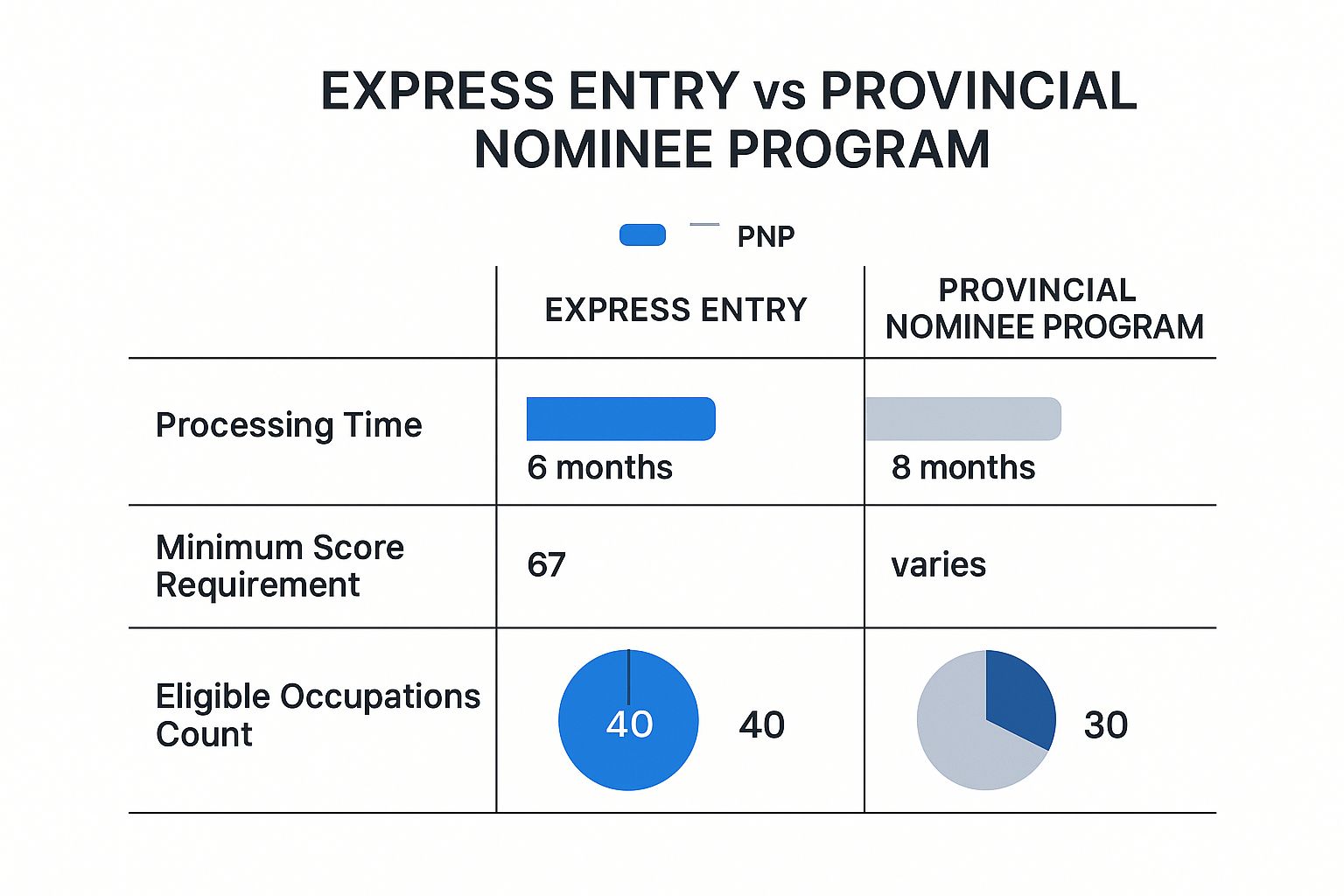Finding Visa Sponsorship Jobs in Canada From Nigeria

So, you're looking for a Canadian job that offers visa sponsorship. It's a goal for many Nigerians, but let's be real—it’s not as simple as just sending out your CV. You need to understand how the system works from the employer's side.
You're not just looking for any job; you're looking for a specific kind of employer. One who is willing to go through a formal government process because they genuinely can't find a Canadian citizen or permanent resident to fill the role. This usually involves a document called a Labour Market Impact Assessment (LMIA) or using a special programme designed for specific skills.
How Visa Sponsorship Really Works
The term "visa sponsorship" gets thrown around a lot, and it can sound like the company just sends you a golden ticket to Canada. While that's the end goal, the process is much more structured.
Canadian companies have two official government programmes they use to hire foreign workers. Knowing the difference between them is the first step in a smart job search. It helps you target the right kinds of jobs and companies.
The Two Main Sponsorship Pathways
Think of these as two different doors into the Canadian job market. The door an employer uses depends on the job itself and your specific qualifications.
Temporary Foreign Worker Program (TFWP)
This is the most common path you'll hear about, especially for jobs where there's a clear labour shortage. Picture a farm in rural Saskatchewan that needs seasonal agricultural workers, or a construction company in Alberta that just can't find enough experienced welders locally.
Before they can even look at your application, that employer has to prove to the Canadian government that no local talent is available. They do this by applying for a Labour Market Impact Assessment (LMIA). A "positive" LMIA is basically a permission slip from the government saying, "Oya, we agree you can't find a Canadian for this job, so you can hire a foreign worker."
International Mobility Program (IMP)
This pathway is a bit different. It’s designed for situations that bring a significant economic, social, or cultural benefit to Canada, and the best part is it doesn't require an LMIA. This makes the process a whole lot faster and less complicated for the employer.
A great example is a cutting-edge AI company in Vancouver hiring a Nigerian data scientist with a very specific, in-demand skillset through the Global Talent Stream. Another might be a multinational bank transferring a top manager from its Lagos branch to its Toronto headquarters. The focus here is on the unique value you bring, not just filling a labour gap.
Visa sponsorship is Canada's way of strategically filling gaps in its labour market. In 2025, the system relies heavily on these two key programmes: the Temporary Foreign Worker Program (TFWP), often for roles facing shortages, and the International Mobility Program (IMP), for highly skilled professionals bringing unique expertise. Knowing which programme your target job falls under is key.
So, how do you know which pathway is more relevant to you? Here's a quick breakdown to help you see where your skills might fit.
TFWP vs IMP: Which Pathway Is for You?
| Feature | Temporary Foreign Worker Program (TFWP) | International Mobility Program (IMP) |
|---|---|---|
| Main Purpose | To fill labour shortages when Canadians are not available. | To advance Canada's economic, cultural, or social interests. |
| LMIA Required? | Yes. The employer must prove no Canadian can do the job. | No. This is the key difference; it's LMIA-exempt. |
| Typical Jobs | Truck drivers, welders, caregivers, farm workers, cooks. | IT specialists from Andela, engineers, intra-company transferees, academics. |
| Employer's Focus | Proving a labour market need. | Proving you meet the criteria of a specific IMP stream. |
| Processing Speed | Can be slower due to the LMIA application process. | Generally faster because the LMIA step is skipped. |
Ultimately, whether an employer uses the TFWP or IMP will shape your application journey. Understanding this helps you tailor your job search and have more informed conversations with potential employers.

As the image shows, immigration routes like Express Entry and Provincial Nominee Programs are often tied to securing a job offer. While a high Express Entry score can speed things up, a job offer through a Provincial Nominee Program can be a fantastic route if your occupation is in high demand in a particular province, even with a lower score.
Getting a handle on these systems is a crucial part of your strategy. For a deeper dive into the paperwork and process, you can explore our detailed guide on how to apply for a work visa.
How to Find Companies That Actually Sponsor Foreign Workers
Knowing where to look is half the battle won when you're searching for visa sponsorship jobs in Canada from Nigeria. I've seen so many talented people waste months sending applications through generic job boards, just hoping something sticks. That's like trying to catch a specific fish by casting a huge net into the entire Atlantic Ocean—it's inefficient and, frankly, demoralising.
To get real results, you need to stop the random searches and start thinking like a detective. Your goal is to pinpoint the companies that aren't just hiring, but are actively looking for and willing to sponsor foreign talent. This means moving beyond casual browsing and learning to use the available tools to your advantage.
Go Beyond Basic Job Board Searches
Standard job sites can be goldmines, but only if you know how to dig. A generic search for "IT jobs in Toronto" will drown you in thousands of listings that aren't for you. The trick is to use specific keywords and filters to uncover the real opportunities.
Here are the platforms I always recommend, and exactly how to use them:
- Canada's Official Job Bank: This should be your first stop. It's the most reliable source, period. Use the "Advanced Search" and find the filter that shows jobs from employers with a validated Labour Market Impact Assessment (LMIA). An LMIA is a direct signal that they've already been approved to hire a foreign worker.
- LinkedIn: Don't just scroll through your feed. Go to the jobs section and use search terms like "visa sponsorship," "LMIA," or "relocation assistance." It’s also a smart move to follow Canadian companies in your industry. Engaging with their posts shows genuine interest long before you even apply.
- Indeed Canada & Eluta.ca: These are massive job boards in Canada. Just like with LinkedIn, you have to be specific. Instead of a broad search, try something like "software developer visa sponsorship" or "registered nurse LMIA." This will immediately filter out most of the noise.
Take a look at this filter on the official Job Bank website—it's absolutely crucial for your search.

This little "For foreign candidates" section instantly separates the regular job postings from the ones actively welcoming international applicants. Using this feature alone can save you countless hours by making sure you only focus on roles you're actually eligible for.
The LMIA Research Trick
Here’s an insider tip that most people miss, and it can give you a massive edge. The Canadian government actually publishes lists of employers who have received a positive LMIA. This isn't some secret; the information is publicly available on the Employment and Social Development Canada (ESDC) website.
By researching a company's LMIA history, you're not guessing if they sponsor—you're working with data. This lets you build a target list of companies that have a proven track record of hiring foreign workers, even if they don't have a sponsored job advertised right now.
This changes the game completely. Now you can proactively target companies you know are open to sponsorship. You could send them a speculative application, mentioning your skills and that you're aware of their history of hiring international talent. Yes, it's a bold move, but it shows you've done your homework and immediately sets you apart from the crowd. This is how you turn a hopeful job search into a successful one.
Get Your CV Noticed by Canadian Hiring Managers
Your Nigerian CV might be packed with incredible experience, but if it isn’t formatted the way Canadian recruiters expect, it could get tossed aside before they even read your name. The game is different over there, and a few small tweaks can make all the difference in your search for visa sponsorship jobs in Canada.
Think of your CV as a marketing tool, not just a work history. You're selling your skills to a brand-new audience.

Let’s start with what you need to cut out immediately. Canadian hiring laws are incredibly strict about preventing discrimination, so your CV must be clean of any personal information.
- No photograph: Unlike back home, you never include a headshot.
- No personal details: Your date of birth, age, marital status, or state of origin have no place on a Canadian CV.
- No long stories: Keep your descriptions short, sharp, and focused on your impact.
Shift Your Focus from Duties to Achievements
In Nigeria, we often list our job responsibilities. In Canada, however, hiring managers are looking for your achievements. They don't just want to know what you were supposed to do; they want proof of how well you did it.
This is where you need to master the STAR method (Situation, Task, Action, Result). It’s a game-changer.
Instead of a generic line like, "Responsible for managing social media accounts," you transform it into a powerful, data-driven statement. Try this instead: "Increased Instagram engagement by 40% in six months (Result) by launching a new content strategy (Action) for three key product lines (Task) to combat declining online visibility (Situation)." See the difference? That sentence proves your value with hard numbers.
Your biggest takeaway should be this: A Canadian-style CV is all about quantifiable results. Numbers cut through the noise. Use percentages, money saved, and specific outcomes to show what you can bring to the table.
Customise Your CV for Every Single Application
Sending out the same CV for every role is the fastest way to get ignored. It's a tough truth, but it’s real. Most large Canadian companies use software called Applicant Tracking Systems (ATS) to screen applications. This software scans your CV for keywords from the job description.
If your CV is missing those exact keywords, a human being will probably never see it.
To get past the robots, you need to beat the resume ATS scanner. Every time you find a job you want to apply for, carefully read the description and weave their language into your CV. If the posting mentions "project management software," you need to have that exact phrase somewhere in your skills or experience section (assuming you have that experience, of course).
Finally, always lead with a strong professional summary. This isn't an "objective" statement about what you're looking for. It's a punchy, 2-3 sentence pitch that explains who you are professionally and the value you deliver.
For example: "Certified Project Manager with 7+ years of experience in the Nigerian fintech sector, with a track record of delivering complex projects on time and 15% under budget." That immediately tells the recruiter you're a serious candidate.
In-Demand Sectors: Where Your Nigerian Skills Are Needed Most
Alright, let's focus on the sectors where your skills are most likely to get you noticed: tech and healthcare. If you've built a career in either of these fields, you’re already holding a winning hand.
These aren't just growing industries in Canada; they are the absolute engine rooms of the economy. Canadian employers are actively and urgently looking for skilled professionals from Nigeria to fill critical gaps, and this is your most direct path to a job offer with visa sponsorship.
Why Tech and Healthcare Are Your Golden Ticket
So, what's driving this demand? It’s a perfect storm, really. Canada has an ageing population that requires more healthcare services than ever before. At the same time, its tech scene is exploding, and there simply isn't enough local talent to keep up. This creates a massive opportunity for you.
When you apply for a role as a software developer or a registered nurse, you’re not just another applicant. You're a solution to a real, pressing national problem. The Canadian government knows this and has even designed specific immigration streams to fast-track people with your exact skills.
Here's a quick look at some of the most sought-after roles for Nigerians looking to make the move.
Top Sponsorship Roles for Nigerian Professionals
The table below breaks down some of the specific jobs that Canadian employers are desperate to fill. Notice the common theme: these are roles that require specialised skills and are crucial to Canada's economic and social well-being.
| Job Title (NOC Code) | Sector | Why It's In Demand |
|---|---|---|
| Software Developer (NOC 21232) | Technology | The backbone of Canada's tech hubs. Every company needs developers, from startups to banks. |
| Data Scientist (NOC 21211) | Technology | Companies are drowning in data and need experts who can turn it into smart business decisions. |
| Registered Nurse (NOC 31301) | Healthcare | A constant, nationwide shortage in hospitals, clinics, and long-term care facilities. |
| Personal Support Worker (NOC 44101) | Healthcare | Essential for supporting Canada’s elderly population and those with medical needs at home. |
| Cybersecurity Analyst (NOC 21220) | Technology | With the rise in digital threats, protecting data is a top priority for all Canadian businesses. |
Think of it this way: you’re not just asking for a job. You’re offering a skill that is in short supply. That simple shift in mindset will completely change how you approach your job search.
Linking Your Skills to a Faster Immigration Path
Here’s where it gets even better. Having experience in these fields gives you a huge leg up in Canada's immigration system, especially through Express Entry. A valid job offer in a high-demand field can add a significant number of points to your Comprehensive Ranking System (CRS) score. A higher score dramatically increases your chances of getting that coveted invitation to apply for permanent residency.
The numbers back this up. Post-pandemic research on job sponsorship trends shows that the healthcare sector accounts for almost 75% of all job postings that mention visa sponsorship.
To give you a concrete example, in May 2025, about 3.2% of all job ads for doctors offered visa sponsorship. For therapy roles, it was 1%, and for dental positions, it was 0.6%. The message is clear: Canada is rolling out the welcome mat for foreign-born healthcare professionals.
Now, for regulated professions like nursing or medicine, there’s an extra step, but it’s a crucial one. You’ll need to get your Nigerian credentials assessed by the right Canadian provincial body. For instance, if you're a nurse aiming to work in Ontario, you’d start the process with the College of Nurses of Ontario (CNO).
Don't wait. Kicking off this process early is a massive signal to Canadian employers that you're serious, organised, and ready to hit the ground running. It makes your application stand out from the crowd.
Acing Your Virtual Interview and Navigating the Job Offer
You’ve done the hard work and finally landed an interview for that Canadian visa sponsorship job. This is your moment to shine, but let's be real—interviewing from Nigeria comes with its own unique hurdles, from unpredictable internet to figuring out Canadian interview etiquette.

First things first, get your tech sorted. Don't let a dodgy connection or background noise sabotage your big chance. Plan for the worst. If NEPA is a known problem in your area, have the genny fuelled up or make sure your inverter is fully charged. Test your internet speed, camera, and microphone at least a full day before the interview. No last-minute surprises.
Mastering the Canadian-Style Interview
Get ready for behavioural questions. Canadian hiring managers are big fans of them. You will almost certainly hear the phrase, "Tell me about a time when…" These questions are designed to see how you’ve actually handled work situations in the past, not just what you would do.
They aren't looking for a simple, one-line answer; they want a story that demonstrates your skills in action. The best way to tackle this is with the STAR method (Situation, Task, Action, Result). For instance, if they ask about handling a difficult client, don't just say, "I solved the problem." You need to paint a picture. Explain the specific situation, what your role was, the exact steps you took, and the positive result—use numbers to quantify your success if you can.
It’s also crucial that you come prepared with your own questions. Asking smart, thoughtful questions shows you’re genuinely interested and have done your homework. Think about asking things like:
- "What does a typical day look like in this role?"
- "How does the team usually collaborate on projects?"
- "Could you tell me a bit about the company’s experience with the visa sponsorship process?"
That last one is a game-changer. It opens the door to discuss their process without putting them on the spot.
The interview is a two-way street. You're not just there to be grilled; you're also figuring out if they're the right fit for you. Your goal is to see if the company has a clear, supportive plan for bringing foreign workers to Canada.
Decoding the Job Offer
Congratulations! You’ve received an offer. This is a massive achievement, but hold off on the celebration for just a moment. Now comes the critical part: carefully reviewing the document to understand exactly what it means for your immigration journey.
Look for key terms that signal the company's commitment. A genuine offer for a visa sponsorship job should be an LMIA-supported offer or explicitly mention their support for a specific immigration programme. If the language is vague about sponsorship, that’s a red flag.
This is your chance to get clarity on the sponsorship details. It is completely normal and expected to ask questions like:
- "Who will be handling the immigration paperwork—will it be your HR team or an external lawyer?"
- "What is the estimated timeline you've seen for the work permit application process?"
- "Are there any costs I will be expected to cover upfront?"
These discussions get everyone on the same page and help you plan your next steps with confidence. The job offer is the final piece of the puzzle, linking your skills directly to your dream of working in Canada. Before you sign anything, make sure you understand the full scope of what’s involved in getting your Canada work visa permit. Knowing all the details will ensure a much smoother transition from applicant to employee.
Got Questions About Visa Sponsorship Jobs? Let's Clear Things Up
Thinking about finding a sponsored job in Canada often comes with a ton of questions. It’s a big move, and it’s completely normal to feel a bit overwhelmed. Let's walk through some of the most common queries I hear from Nigerians just like you, so you can tackle this process with confidence.
First up, the big one: "Do I need to pay an agent to find me a job?" The answer is a hard no. You absolutely do not need to pay anyone to find a job for you. Legitimate Canadian employers post their openings on public platforms like the official Job Bank, LinkedIn, and other well-known job boards. If someone asks you for money in exchange for a guaranteed job, walk away. That's a classic red flag for a scam.
What Are My Immigration Options?
People often wonder if a job offer is the only ticket to Canada. While having one is a massive advantage, it's not the only way in.
Canada's Express Entry system is the main route for skilled workers in 2025, and you can get in the pool even without a job offer. The system is designed to invite professionals in high-demand fields to fill labour gaps. Think of roles in healthcare, tech, and the skilled trades.
Having a sponsorship offer will give your Express Entry profile a huge boost, but it's not always a must. For example, registered nurses (NOC 31301) are consistently in high demand. If you're in a sought-after occupation, you might get an invitation based on your skills alone. You can see a breakdown of top jobs for Express Entry on immigration.ca.
Another popular question is about family. "Can I bring my spouse and children?" Yes, you can. When you get a work permit, your spouse or partner can usually apply for an open work permit, which lets them work for almost any employer in Canada. Your kids can also apply for study permits to attend school. It’s one of the best things about Canada’s immigration approach.
What About When I Arrive?
Okay, so what happens after you actually land? A practical concern is healthcare. Once you arrive, there’s often a waiting period before you're covered by the provincial health plan. To make sure you and your family are protected from any unexpected medical bills during that gap, looking into international health insurance is a smart move.
The most important thing to remember is that patience and thorough research are your best friends. The process is a marathon, not a sprint. Focus on legitimate sources, tailor your applications, and prepare diligently for each step.
By getting answers to these common questions, you can cut through the noise and focus your energy on what really matters: showing Canadian employers the incredible skills you have to offer.
Ready to simplify your Canadian immigration planning? JapaChat is Nigeria's first AI immigration expert, designed to give you instant, accurate answers to all your relocation questions. Get started for free and plan your journey with confidence at https://japachat.com.

Leave a Reply